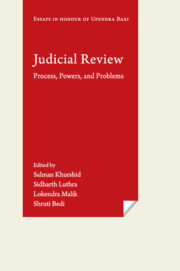Book contents
- Frontmatter
- Contents
- Foreword
- Editors' Note
- Introduction
- 1 The Inadequacy of Judicial Enforcement of Constitutional Rights Provisions to Rectify Economic Inequality, and the Inevitability of the Attempt
- 2 The Interplay of Law and Politics in India
- 3 Beating the Backlog: Reforms in Administration of Justice in India
- 4 Judicial Review: Perspectives and Reflections for the Twenty-First Century
- 5 When ‘Creeping Jurisdiction’ Goes Awry: The Social Action Litigation to Ban Surrogacy
- 6 Judicial Review and the Democratic Judge
- 7 Judicial Review: A Tool to Shape Constitutional Jurisprudence
- 8 The Baxian Bioscope on Indian Judicial Process
- 9 Judicial Activism, Courts, and Constitutional Revolutions: The Israeli Case
- 10 Democracy, Constitution, and Judicial Review: A Critique
- 11 A Minor Jurisprudence of Pathos: Upendra Baxi as Teacher and Writer
- 12 The Need for Reinventing the Supreme Court as a Constitutional Court
- 13 Appointment of ‘Distinguished Jurists’ as Judges in the Supreme Court of India: A Critical Analysis
- 14 Judicial Dissent and Judicial Review: A Functional Analysis
- 15 The Power of Judicial Review: Judicial Chutzpah or Judicial Desideratum
- 16 Judicial Review of Legislations by Tribunals in India: Law, Problems, and Perspectives
- 17 Criminalization of Membership of Terrorist Organizations in India and the United States of America: Human Rights Concerns
- 18 Article 142 of the Indian Constitution: On the Thin Line between Judicial Activism and Restraint
- 19 Sketching the Limits of Article 142 of the Constitution of India: A Constitutional Necessity
- 20 Constitutional Morality and Judges of the Supreme Court
- About the Contributors
- Index
Introduction
Published online by Cambridge University Press: 23 January 2020
- Frontmatter
- Contents
- Foreword
- Editors' Note
- Introduction
- 1 The Inadequacy of Judicial Enforcement of Constitutional Rights Provisions to Rectify Economic Inequality, and the Inevitability of the Attempt
- 2 The Interplay of Law and Politics in India
- 3 Beating the Backlog: Reforms in Administration of Justice in India
- 4 Judicial Review: Perspectives and Reflections for the Twenty-First Century
- 5 When ‘Creeping Jurisdiction’ Goes Awry: The Social Action Litigation to Ban Surrogacy
- 6 Judicial Review and the Democratic Judge
- 7 Judicial Review: A Tool to Shape Constitutional Jurisprudence
- 8 The Baxian Bioscope on Indian Judicial Process
- 9 Judicial Activism, Courts, and Constitutional Revolutions: The Israeli Case
- 10 Democracy, Constitution, and Judicial Review: A Critique
- 11 A Minor Jurisprudence of Pathos: Upendra Baxi as Teacher and Writer
- 12 The Need for Reinventing the Supreme Court as a Constitutional Court
- 13 Appointment of ‘Distinguished Jurists’ as Judges in the Supreme Court of India: A Critical Analysis
- 14 Judicial Dissent and Judicial Review: A Functional Analysis
- 15 The Power of Judicial Review: Judicial Chutzpah or Judicial Desideratum
- 16 Judicial Review of Legislations by Tribunals in India: Law, Problems, and Perspectives
- 17 Criminalization of Membership of Terrorist Organizations in India and the United States of America: Human Rights Concerns
- 18 Article 142 of the Indian Constitution: On the Thin Line between Judicial Activism and Restraint
- 19 Sketching the Limits of Article 142 of the Constitution of India: A Constitutional Necessity
- 20 Constitutional Morality and Judges of the Supreme Court
- About the Contributors
- Index
Summary
‘Upendra Baxi’, the name, I read for the first time in or about 1968 just below the title ‘“The Little Done, the Vast Undone”: Some Reflections on Reading Granville Austin's The Indian Constitution’, published in the Journal of the Indian Law Institute. Impressed not only by the title and the size of the paper—107 pages—but also by its writing style, I continued to be confused about the nationality of the author until quite a few persons confirmed that he was very much an Indian who also worked at the Indian Law Institute for some time, even in the editorial team of the Journal of the Indian Law Institute. Confusion also persisted because around that time some foreign scholars like A. R. Blackshield had written quite long articles running into more than one issue of the journal, while no Indian scholar had ventured to do so until then. Later, I had the opportunity to read one of his articles, perhaps in the Jaipur Law Journal, on the issue of compensation for acquisition of property as decided in the Shantilal case, which in his opinion amounted to ‘paying peanuts for the gold coin’. The two writings showed similarity in his concern for sustaining traditional civil rights with little regard to the constitutional philosophy represented in the Directive Principles of State Policy. It was much later, perhaps after the 1975–1977 Emergency, when the Supreme Court shifted its emphasis from haves to have-nots that Professor Baxi also came up with ‘taking suffering seriously’ and removing weapons of impoverishment of people.
After shifting from the small-town Meerut College to Delhi University in 1970, sometime in late 1971 or early 1972 I heard that Professor Baxi had also been appointed as professor of law where I was a junior lecturer. I got the first opportunity to see him in person after he joined as Professor-in-Charge of Law Centre II of the Faculty of Law in 1973. Given the difference between his and my position at the university as well as the daunting impression left by his writings on me, I was always hesitant about introducing myself and talking to him.
- Type
- Chapter
- Information
- Judicial Review , pp. 1 - 12Publisher: Cambridge University PressPrint publication year: 2020



